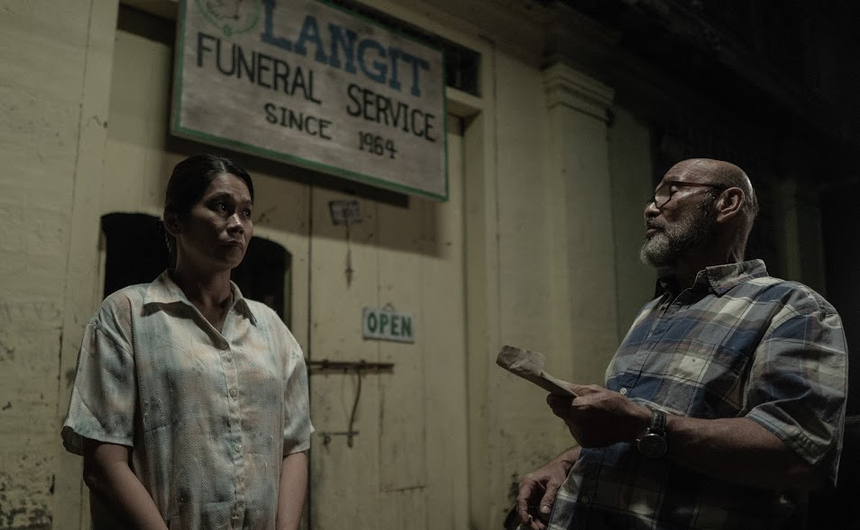Fantasia Review 2019: ODE TO NOTHING Tells a Curious Ghost Story of Death and Minimalism

In deep focus photography and an olive-pewter colour palette that is nearly monochrome comes a crafted and curious film out of the Philippines.
We first meet Sonya winding up the innards of a cassette tape so she can keep listening to her favourite piece of music, a vintage Chinese love song. It is a lovely metaphor for holding too dearly on to the past. The more we replay (relive) it, the more the more ossified and crinkled things can get. Living in your memory of the past, surrounded by only past things, can jam up the rest of your life like a mangled tape in a cassette-player. One might consider Ode to Nothing a deadpan, Filipino ghost-story echo of Marie Kondo’s bestseller, The Life Changing Magic of Tidying Up.
Sonya spends here day selling funeral packages for the family business, Langit Funeral Services. Expensive coffins and sad flower arrangements of escalating cost, are presented to bereaved families who never have enough money to pay for the full service. The burial racket, I am guessing, has always been one of those things, like weddings and new babies, where emotion and money collide. Only in the case of the former, it is not happiness and the future, but loss and the past. And those in the undertaker business have to wait for people to die to make money.
Her father drives the hearse, but mainly observe him eating silently, far off in the background of director Dwein Baltazar intensely composed ‘square’ (1.33:1) or rather ‘boxed in’ framing. The film is often shot through doorways and windows, with Sonya clearly trapped in the house, and in the clutter, but distant from her only relative who shares the same space.
The film rarely leaves her domestic prison, which also contains the shop, and by extension, her life. The camera, without movement, unflinchingly observes from the outside looking in. Many of these portals have iron bars. To make matters worse, Trevor the debt collector makes a weekly visit to demand what little profit the business makes as 'interest payments.' He holds the deed to the family home over their head like a violent threat. Tired of merely repossessing the antique furniture, he is coming after the house.
Sonya’s only joy comes from the visits of a the young man named Elmer, who sells taho drinks door to door. They make small talk and he lights her cigarettes while she is on break from her dismal job and home life. She worries that because she smells like rotting flesh from her work, he will not notice her sexually. She is constantly biting her nails and spitting them out.
Things get lively, however, when gangsters drop off a elderly Jane Doe corpse and some money to ‘deal with it.’ Sonya cleans up with woman, embalms her, and what is initially baffling choice, brings the body into her bedroom to keep company. She eventually even sets her a place at the kitchen table. It is morbidly amusing, and a bit absurd, in how the body is propped up and tied to a door with old drapes and dresses.
The solitude and stress has gotten so sour, that having a surrogate mother, even a dead one, is for a time, cathartic. It patches up the estranged relationship with her father. A scene where he discovers what is daughter is up to, unethically as it is, provokes not a freak out, but rather sees him go into his own wardrobe and pick out appropriate clothing from his deceased wife for the Jane Doe to wear. He begins to hear the corpse lady speak to him, even pleasantly fight with him about trivial things, presumably as his former wife behaved.
With a temporary respite from money issues, and a little joy in the house. There is cake and dancing; even the damaged cassette tape seems to work again for a spell. Ultimately, this kind of mockery, (as Catholic as the Philippines is, or otherwise) cannot be a solution. Joyce and her dad have to deal with their household and their debts.
Tackling themes of money, social conventions and the cost of closure, Ode To Nothing is a meticulously constructed art film that flirts with genre (from ghosts stories to Weekend At Bernies). Instead of haunting thrills and chills — it even has a lack of score except the use of one old song — it goes strait for the horror of the loneliness when one fails to move on from a death in the family. Sonya and her father are trapped as much by their possessions that they struggle to maintain a memory of the past. The irony of their situation is not lost that they run a supply store for the very expensive ritual that is supposed to provide a sense of closure.
The acting here is understated but rich, Marietta Subong (the popular comedienne, pop star and actress also known as Pokwang) is in almost every frame, and can express multitudes with her quiet, composed, face. The production design and framing are nothing short of astounding. Ode To Nothing is a period piece, maybe, but the colour, or lack thereof, and the dilapidated old house make it a universal, if peculiar tale of melancholy horror: The absurdities of the human condition. Perhaps we could all use some Marie Kondo minimalism to spark joy and exorcise our ghosts.
The final title card, as it appears in the film as a kind of 'Fin,' or 'The End,' is a sublime bit of poetry and prose.
Oda Sa Wala
Director(s)
- Dwein Baltazar
Writer(s)
- Dwein Baltazar
Cast
- Dido de la Paz
- Anthony Falcon
- Joonee Gamboa
- Pokwang

Do you feel this content is inappropriate or infringes upon your rights? Click here to report it, or see our DMCA policy.






